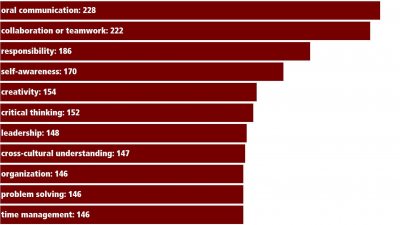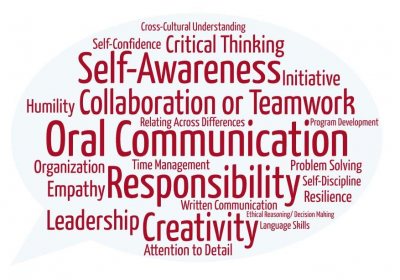What did they learn last semester?
During the Fall semester at Bates, 533 students completed at least one Community-Engaged Learning (CEL) course in departments and programs including Politics, Psychology, Anthropology, Mathematics, Biology, Sociology, Education, Environmental Studies, Digital and Computational Studies, Rhetoric, and the First Year Seminar. Students’ end-of-semester evaluations of their CEL experience produced robust quantitative and qualitative data. For example, the vast majority of students reported that their community-engaged work correlated well with and deepened their mastery of course content, enhanced their investment in the course they took and their understanding of how power and privilege are at play in the world, and helped them cultivate a wide range of real-world skills. The table below shows the top ten skills that last semester’s students report developing through their community-engaged academic work.
 In open-ended narrative questions, students were invited to identify both the least and most valuable or meaningful dimensions of their Community-Engaged Learning experience. Frustrations and disappointments included challenges establishing reliable communication channels with fellow students and community partners, the need to change course when conditions on the ground changed, and occasional transportation woes. Interestingly, by far the most common response to the question about what was “least valuable, meaningful, or satisfying” was “Nothing!” By contrast, students had plenty to say when asked to share what was most valuable, meaningful, or satisfying about their CEL experience. Some of those responses — from diverse courses and reflecting a wide range of community-engaged academic projects — are below:
In open-ended narrative questions, students were invited to identify both the least and most valuable or meaningful dimensions of their Community-Engaged Learning experience. Frustrations and disappointments included challenges establishing reliable communication channels with fellow students and community partners, the need to change course when conditions on the ground changed, and occasional transportation woes. Interestingly, by far the most common response to the question about what was “least valuable, meaningful, or satisfying” was “Nothing!” By contrast, students had plenty to say when asked to share what was most valuable, meaningful, or satisfying about their CEL experience. Some of those responses — from diverse courses and reflecting a wide range of community-engaged academic projects — are below:
- “It was inspiring to see the kids excited to learn and so engaged. I even had a conversation with a student who shared his hopes and dreams to be the first kid in his family to go to college. Not only did he want to be the first to go to college, but he dreamed of going to an academically challenging, prestigious school.”
- “The most valuable thing was getting to know more about the work that the Restorative Justice Institute of Maine (RJIM) has been doing in Lewiston schools and being able to analyze this data from a whole host of different angles. I felt this course and its partnership with RJIM not only deepened my analytical skills, but also gave me great insight into the workings of restorative justice, program implementation, and the various issues faced and how these could possibly be addressed.”
- “I loved being able to create an exhibit that was actually something our local Museum L-A can use. I thought it was really cool how we were able to contribute in a meaningful way.”
- “Being able to share science with the middle schoolers was a great experience. It was fun to try and engage them in a topic that sometimes kids can find dull or boring.”
- “It was nice to do meaningful work that had real impacts on communities.”
- “My community-engaged learning course had a close connection to working in the real world, and as a result it felt like a course designed to improve collaboration and analysis outside of the classroom setting. In this way, my course felt like it prepared me beyond the structure and assignments of the course.”
- “The most valuable lesson I took away from field work was the importance of the relationship and dynamic between teacher and student in a classroom, specifically a special education classroom. I believe much of the students’ motivation to learn and work hard came from their care and respect for their teacher.”
- “[Most valuable was] the collecting of meaningful data that I know my community partners can base future work on.”
- “I enjoyed talking to members of the Stanton Bird Club in the beginning of the semester and being able to present our restoration ecology ideas to them at the end. I felt like I contributed to an important project.”
- “I love working with the Immigrant Resource Center of Maine because I am able to capitalize on Bates’ ethos of community-engaged learning by forming real relationships with people across cultures. These are mutually beneficial relationships, and it is wonderful to engage with the community in a way that disrupts inequitable dynamics of servitude.”
 “It was really valuable to me to gain experience doing something that could be similar to what I could be doing in a job after Bates. It was cool to see a project through, from the beginning to the end of the semester, that is about an actual piece of land in the community.”
“It was really valuable to me to gain experience doing something that could be similar to what I could be doing in a job after Bates. It was cool to see a project through, from the beginning to the end of the semester, that is about an actual piece of land in the community.”- “Knowing that I was contributing to the advocacy work that KIDS Legal was doing was super meaningful to me.”
- “[Most valuable was] learning about the needs of populations that are underbanked or unbanked, because this is a group of people I did not have much prior experience working with, and a group that has experiences completely different from my own.”
- “I appreciated learning about how important it is for us to be ethical when handling specific information.”
- “I learned the power of well-written emails!”
- “The most valuable aspect of this experience was being able to hear how community-oriented organizations are trying to advocate for racial justice by dismantling systemic racism in Maine.”
- “I gained so much from listening to what my CEL partners / participants had to say instead of imposing myself and what I thought on them.”
- “Going to Bates sometimes feels like living in a bubble, and community-engaged learning experiences make me feel like I am bursting that bubble.”
- “We got to help make important decisions about what organizations should get funded. It was a big responsibility.”
- “It was great to explain a new topic to a student and then have them be able to answer questions about it and demonstrate that they now understood it.”
- “What was most valuable for me was the opportunity to work on such an important topic both in Lewiston and Maine (substance-use disorder).”
- “Becoming aware of what was occurring in the community truly allowed me to understand the importance of political participation and the importance of continuing to stay politically active.”
- “We know that the data we collected will be put to immediate and practical use by our community partner in the very near future.”
- “The most meaningful moment came when presenting the culmination of my research and hard work with my community partner, as well as with my thesis advisor and my mom. It was an extremely special and rewarding moment that I will not forget.”
Thanks for your interest in community engagement at Bates! If you’d like to support our work or learn more about it, don’t hesitate to give us a holler at the Harward Center anytime.